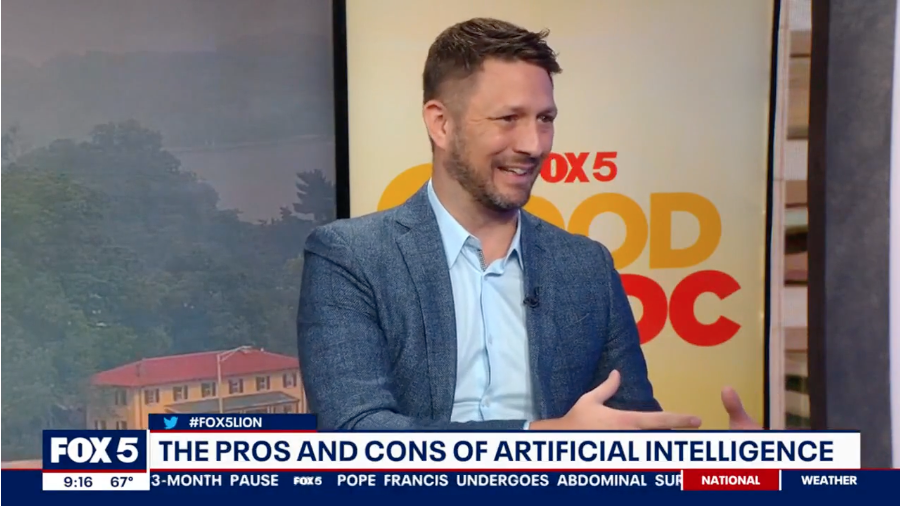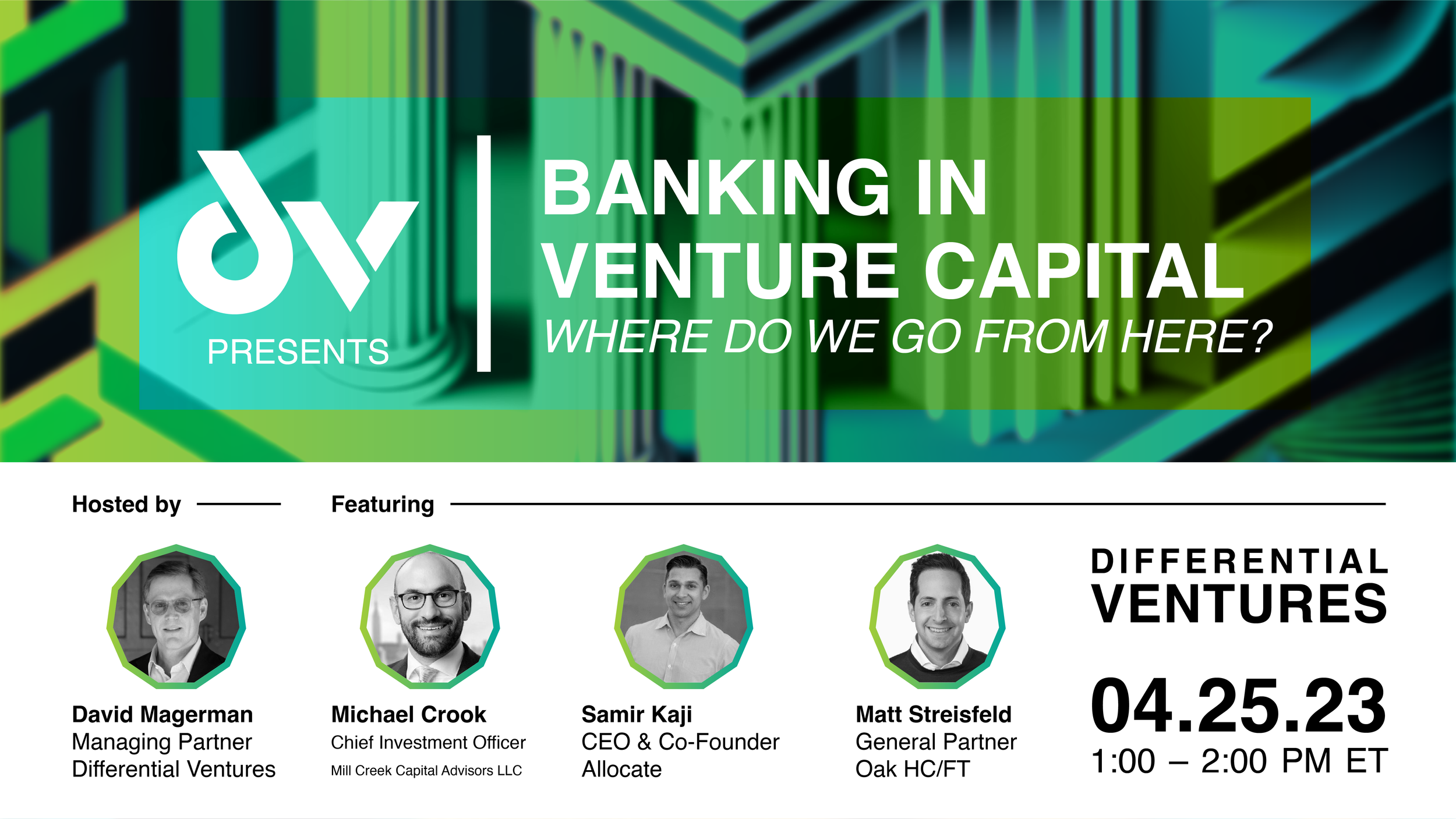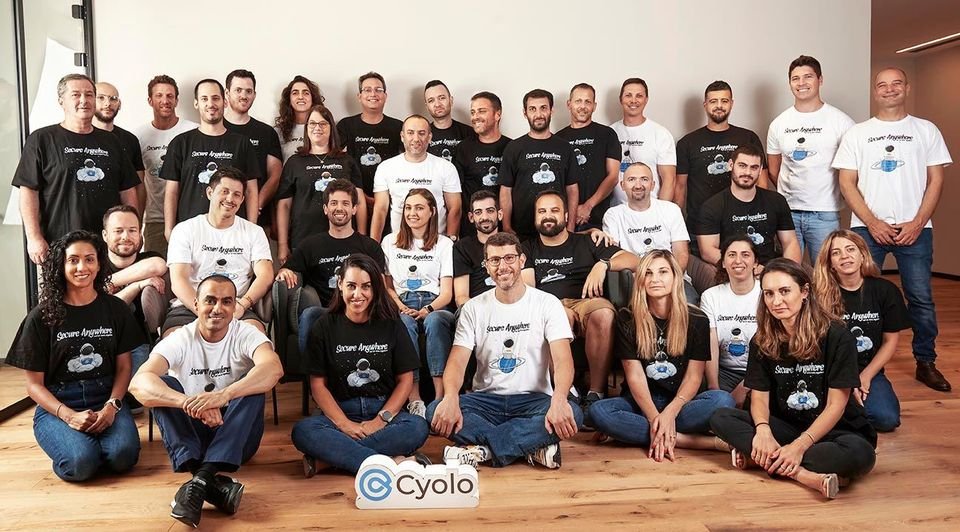News & Insights
On the Record with Moshe Hecht Hatch.AI Founder & CEO
Differential goes on the record with Moshe Hecht, an award-winning philanthropic futurist and innovator, reshaping the world of giving through technology and data solutions. The founder and CEO of Hatch, he is a dedicated philanthropist and has been published in Forbes, Guidestar, and Nonprofit Pro.
Driving Sustainability through Employee Benefits with Scope Zero CEO Lizzy Kolar
The WorkplaceTech Spotlight host Hadeel Al-Tashi sits down with Lizzy Kolar, Co-Founder and CEO of Scope Zero to dive into how Scope Zero's Carbon Savings Account (CSA) empowers employees to make affordable home technology and transportation upgrades while aligning with corporate sustainability goals. They discuss how the CSA not only supports environmental and financial wellness for employees but also strengthens a company's commitment to sustainability. Don't miss this opportunity to learn how integrating green benefits can drive meaningful impact within your organization.
On the Record with Nate Cavanaugh, CoFounder & Co-CEO of FlowFi
On the Record with Nate Cavanaugh, CoFounder & Co-CEO of FlowFi.
In 2021, Nate co-founded of FlowFi, a SaaS-enabled marketplace that connects startups and SMBs with finance experts. FlowFi has raised $10M from top VC firms including Blumberg Capital, Differential Ventures, Clocktower Ventures and Precursor Ventures, and generated 7-figures of annual recurring revenue in its first year.
Nate was nominated to the Forbes 30 Under 30 list for Enterprise Technology.
Cyolo’s Almog Apirion on Nasdaq TradeTalks
NASDAQ: Nasdaq TradeTalks: 2024 Cybersecurity Budget Outlook with Almog Apirion, Cyolo.
Nick Adams Discusses How To Get Your Generative AI Startup Funded
AI and the Future of Work Podcast: Entrepreneurs wonder what it’s like to be a VC. And VCs without an operating background often don’t understand the grit required to turn an idea into a successful business. The best investors have been successful operators first.
Today’s guest is one of those. Nick Adams founded Differential Ventures in 2017 to invest in B2B, data-first seed-stage companies. Since then, Nick and the team have invested in an impressive group of companies including Private AI, Ocrolus, and Agnostiq.
On the Record with Elissa Ross, CoFounder & CEO of Metafold
On the Record with Elissa Ross, CoFounder & CEO of Metafold. Elissa Ross is a mathematician and the CEO of Toronto-based startup Metafold 3D. Metafold makes an engineering design platform for additive manufacturing, with an emphasis on supporting engineers using metamaterials, lattices and microstructures at industrial scales. Elissa holds a PhD in discrete geometry (2011), and worked as an industrial geometry consultant for the 8 years prior to cofounding Metafold. Metafold is the result of observations made in the consulting context about the challenges and opportunities of 3D printing.
Nick Adams: What Regulations Need to Be Put in Place to Ensure the Safe Use of AI in the U.S.?
Nick Adams on PM360: To get a better grasp on what eventual AI regulations could and should look like, PM360 spoke with Nick Adams, Founding Partner at Differential Ventures. In addition to starting the venture capital firm focused on AI/machine learning in 2018, Adams is also a member of the cybersecurity and national security subcommittee for the National Venture Capital Association and recently briefed members of Congress on AI policy and potential regulation.
Nick Adams: Where’s AI headed in the workplace? VCs weigh in
Nick Adams on TECHBREW: For all the pixels spilled about the promises of generative AI, it’s starting to feel like we’re telling the same story over and over again. AI is serviceable at document summarization and shows promise in customer service applications. But it generates fictions (the industry prefers the euphemistic and anthropomorphizing term “hallucinates”) and is limited by the data on which it’s trained.
David Magerman: Artificial Intelligence’s Glass Ceiling
David Magerman on THEINFORMATION: OpenAI’s stated goal is to develop and promote a software system capable of artificial general intelligence. Toward that end, the company has released systems based on large-language models, which can respond to prompts with fluent conversation on many subjects. ChatGPT, Microsoft’s Bing chatbot and other new systems based on OpenAI’s GPT-3 and GPT-4 models are truly incredible and perform far beyond previous attempts at achieving AGI.
Nick Adams on Fox5: Artificial Intelligence Pros and Cons
FOX5 WASHINGTON DC: Nick Adams discusses the pros and cons of Artificial intelligence.
Differential Ventures Specializes In Being Advisors For AI Companies
PULSE 2.0: Differential Ventures is a seed-stage venture capital fund that was founded by data scientists and entrepreneurs for data-focused entrepreneurs. To learn more about the firm, Pulse 2.0 interviewed Differential Ventures’ managing partner and co-founder Nick Adams.
Quantum commercialization: softly, softly towards the inevitable future
DIGINOMICA: What can an early-stage investor tell enterprises about the nascent quantum market?
The quantum tipping point – that fabled moment when quantum technologies break through to commercial adoption at scale – has been questioned in a previous diginomica report…
Why Investors Bank on Quantum Commercialization
ENTER QUANTUM: Experts agree that commercial quantum computing at scale could be as much as 10 years away, but this hasn’t stopped investors from betting on it turning a profit in the near future. U.S. tech venture capital company Differential Ventures led the recent $6 million seed extension round for quantum software company Agnostiq which it will use to accelerate further development and commercialization of its enterprise-grade quantum and high-performance computing platform Covalent.
In this Q&A, Differential founding partner David Magerman explains why investors are throwing their weight behind commercial quantum now.
Banking in Venture Capital & the Tech Industry
On Tuesday, April 25th, 2023, Differential Ventures hosted a webinar on “Banking in Venture Capital & the Tech Industry”. The panel was moderated by David Magerman, Managing Partner of Differential Ventures, and joined by guest speakers Michael Crook (Chief Investment Officer, Mill Creek Capital Advisers), Samir Kaji (CEO & Cofounder, Allocate), and Matt Streisfeld (General Partner, Oak HC/FT).
Nick Adams: What to Do When Your Balance Sheet Doesn’t
Sand Hill Road Podcast: Nick Adams joined the Sand Hill Road podcast to discuss the way startups can survive a downturn.
David Magerman: Why Sophistication Will Win Out In The Machine Learning Ops Sector
UniteAI: There’s no question that machine learning operations (MLOps) is a burgeoning sector. The market is projected to reach $700 million by 2025 – almost four times what it was in 2020.
Still, while technically sound and powerful, these solutions haven’t generated the expected revenue, which has raised concerns about future growth.
The Implications of Generative AI in Different Parts of Industry & Society
On Thursday, March 16th, Differential Ventures hosted our first webinar entitled Implications of Generative AI in Different Parts of Industry + Society. The panel was moderated by David Magerman, Managing Partner of Differential Ventures, and joined by guest speakers Sharon Zhang (Cofounder & CTO, Personal.ai), Erik Bernhardsson (Founder, Modal Labs), and Adam Oliner (Founder & CEO, Graft).
The Seed of Success
Welcome to the "Private Placement Perspective," a new pod storm series hosted by Matt Brown. In this first series of 2023, Matt dives deep into the world of venture capital and investing, speaking with investors and CEOs who have successfully helped scale start-ups.
How to Pitch Me
TECHCRUNCH: How to pitch me—7 investors discuss what they’re looking for in March 2023
Systemic Bias in Data Makes AI a Stereotype Machine
InsideBigData: Artificial intelligence (AI) software systems have been under attack for years for systematizing bias against minorities. Banks using AI algorithms for mortgage approvals are systematically rejecting minority applicants. Many recruiting tools using AI are biased against minority applicants. In health care, African Americans are victims of racial bias from AI-based hospital diagnostic tools. If you understand how data science research produces the models that power AI systems, you will understand why they perpetuate bias, and also how to fix it.
On the Record with Deddy Lavid, CoFounder & CEO of Cyvers
On the Record with Deddy Lavid, CoFounder & CEO of CyVers. Deddy Lavid is a serial ML entrepreneur. He is skilled in giving life to abstract, cutting-edge ideas and turning them into powerhouses. He has founded 3 startups from the ground up (a 0 to 1 kind of person), including one which was acquired, and one that is currently growing fast. Deddy loves envisioning the future and builds amazing teams that focus on making these visions a reality.
How global unrest will impact innovation in 2023
TECHCRUNCH: The global economic and political turmoil of the past year has had a meaningful impact on corporate innovation in the technology industry and beyond. All of these factors have led to belt-tightening in the corporate world, layoffs and hiring freezes and a more conservative investment posture from the investment community. Inevitably, these changes will have a chilling effect on innovation in the years to come.
However, there is perhaps a silver lining when it comes to the prospects for innovation. In some ways, these market forces might actually serve as an accelerant for creativity and advancement in technology.
David Magerman in Fast Company’s “The Biggest Tech Trends of 2023”
FAST COMPANY: Fundraising as a business model is dead. Valuations in the tech industry will ultimately settle above pre-pandemic levels, but down from 2021. The top companies will be surprisingly closer to the record highs. There is still a significant amount of undeployed cash in venture funds at all stages. Investors and managers are still smarting from recent pain, and appropriately chastened by overly exuberant valuations, but they will have to deploy their capital eventually. Once markets and macroeconomic forces stabilize, we should see the strong companies returning to 2021 valuations.
On the Record with Tomide Adesanmi, CoFounder & CEO of Circuit Mind
Tomide Adesanmi is the Co-founder/CEO of Circuit Mind, a venture-backed startup that is developing intelligent software for electronic engineers. Circuit Mind's software enables electronics teams to design faster and better by specifying their input requirements and exploring automatically generated design options in seconds/minutes. Before Circuit Mind, Tomide was an electronic systems engineer at BAE Systems, where he developed Heads Up Display Systems and Helmet Mounted Display Systems for jet fighter pilots.
Startup Hustle Podcast with David Magerman: The Limits of AI/ML
n this episode of Startup Hustle, Matt DeCoursey and David Magerman, Managing Partner & CTO of Differential Ventures, talk about the limits of AI/ML. Learn about AI and ML learning modes, their limitations, and how you can maximize the use of data and machine learning to improve your own processes.
On the Record with Itay Sinuani, CoFounder & CEO of Demoleap
Itay Sinuani is the Co-Founder & CEO of Demoleap. He has a Bachelor of Science in Industrial Engineering and Management; Information Systems Engineering, and an MBA from the Tel Aviv University Coller School of Management. Itay previously worked at ServiceWise and Salesforce before founding Demoleap in 2019. He currently lives in the Tel Aviv area with his family.
Alternative Fund Podcast with Renaissance veteran and venture capitalist David Magerman
David Magerman, a venture capitalist with Differential Ventures and former quantitative hedge fund manager with Renaissance Technologies, was the guest on episode five of the Alternative Fund Insight podcast.
On the Record with Marc Stevens, CEO & CoFounder of Row64
Marc is the Co-Founder and CEO at Row64. Previously, Marc was the CEO of Boon AI (a Gradient Ventures portfolio company), bringing “low code” machine learning solutions to the media and entertainment markets. Before getting into startups, Marc spent 25 years as a technology executive in the media and entertainment markets for large multi-national corporations, managing industry-leading product portfolios for Autodesk's media and entertainment division, the 3D division of Avid Technology, and the Softimage division of Microsoft.
On the Record with Sarah Nagy, CEO of Seek AI
Sarah started Seek back in September 2021, and comes from a quant/data science background. Sarah started her career as an astrophysics researcher and then became a quant doing algorithmic trading at ITG. She then led the quant efforts at two startups (Predata and Edison, both acquired by unicorns) as well as the consumer data team at Citadel’s Ashler Capital. Sarah has B.A./B.S. degrees in Astrophysics and Business Economics from UCLA, and an MFin degree from Princeton.
Q&A: Former Renaissance quant David Magerman on how VCs can use data
PITCHBOOK: After two decades inside Renaissance Technologies, the legendary quantitative hedge fund founded by James Simons, David Magerman was ready for something different.
Data-Driven Work Cultures
Be open with your employees about how data is being used. People don’t like to be manipulated by tools or management. A few years ago, we looked at a startup that was using data generated by work tools, like email, Slack, and other communication tools, to evaluate how employees were collaborating. They planned to deploy this tool to help managers and human resources departments identify employees that weren’t integrating with their teams, weren’t being managed well, and might be likely to want to leave their jobs.
On the Record with James Dirksen, CEO of DeepSurface
James Dirksen is co-founder and CEO of DeepSurface Security, the first risk-based vulnerability management platform that allows cybersecurity teams to automate the process of analyzing and prioritizing vulnerabilities. A serial entrepreneur and accomplished executive, James brings a unique blend of leadership in the private and public companies to DeepSurface.
The Dynamics of Scaling with David Magerman
THE MODERN CFO PODCAST: Renowned computer scientist, investor, and current co-founder of Differential Ventures joins Andrew Seski on The Modern CFO to discuss the early intersection of computer science and investing at IBM, teaming up with Jim Simons at Renaissance, and why venture investors need to meet their founders where they are.
On the Record with Brett Whitsitt, Founder & CEO of Squire Solutions
Brett Whitsitt brings a lot of experience to his role, built on a foundation of servant leadership & passion for National Security. As a SEAL Officer, having led troops in combat during 4 deployments or directing special operations activity across 12 countries in Europe, he has deep knowledge of the strategic, operational, and tactical requirements across military and emergency response segments. After service, he earned a Wharton MBA while working at J.P. Morgan in the Leveraged Finance Group. His military and business experience fortify the firm’s position to deliver results and exceed expectations.
CyberWire Daily Podcast with Dave Bittner featuring Nick Adams
Our guest today is Nick Adams, a co-founder and managing partner at Differential Ventures. We chat about the definition of AI, Nick's skepticism of some AI concepts, AI's effect on employment, which jobs cannot be automated, and existential risk from AI.
On the Record with Zeeshan Zia, CEO of Retrocausal
Zeeshan Zia is the CEO at Retrocausal, a Seattle-based company that builds computer vision software focused on improving manual assembly work in manufacturing. Before founding Retrocausal, Zeeshan worked as a scientist and shipped multiple AI-first products at Microsoft, NEC, and Qualcomm. Zeeshan holds a PhD in computer vision from the Swiss Federal Institute of Technology, Zurich and led a research group as a postdoctoral scientist at Imperial College London in the early 2010s, before joining the corporate world.
David Magerman: Fixing the Supply Chain: How AI Can Help, and How it Can Hinder
SUPPLY CHAIN BRAIN: Over the past few decades, globalization has improved the efficiency of our economic system. Goods, labor, natural resources and even services are now sourced from every corner of the world, and delivered nearly anywhere at lightning speed.
Nick Adams: Startups Acquiring Startups
CRUNCHBASE: By nearly every measure, 2021 was an astounding year for venture capital and tech startups. While VC mega rounds, massive IPOs and SPACs may have dominated the headlines, tech M&A transactions increased by more than 30 percent from 2020 and deal value increased more than 50 percent to nearly $900 billion.
David Magerman: How data fuels the evolving customer journey
VENTUREBEAT: Have you ever had one of those creepy experiences where you’re talking about something — a product or service like skinny jeans or car rentals — and then ads start showing up on Amazon, Google, and Facebook related to your conversation? No, big tech isn’t listening to you, or at least not all the time. You might not realize it, but your communications often leave trails of breadcrumbs behind — in your email, search history, credit card purchases, and other places within the digital universe. Whether its third-party cookies or data sharing arrangements between technology companies, it’s effortless for advertisers and ecommerce sites to design targeted ads eerily relevant to your day-to-day life.
On the Record with Elliot MacGowan, COO of Agnostiq
Elliot is the co-founder and COO of Agnostiq. Prior to Agnostiq Elliot worked at Bell Canada in various operational and strategic roles. Elliot received his MBA from the University of Toronto, where he spent the majority of his time hanging around the Creative Destruction Lab.
Reverse Engineering Customer Journeys And Being At The Pulse Of Data Privacy Regulation
FORBES: The topics of unprecedented growth and consumer data privacy are two areas that will continue to have a major impact on leading brands in the year ahead. The combination of accelerated digital transformation and more stringent rules around data privacy will be at the heart of customer experience (CX) innovation in 2022 and beyond. As a result, Chief Marketing Officers are quickly morphing into Chief Growth Officers who are now tasked with driving this type of CX enhancement, via superior data architectures and tightened alignment with their respective Chief Technology Officers.
No-Code, Low-Code Machine Learning Platforms Still Require People
INFORMATION WEEK: No-code, low-code (horizontal) machine learning platforms are useful at scaling data science in an enterprise. Still, as many organizations are now finding out, there are so many ways that data science can go wrong in solving new problems. Zillow experienced billions of dollars in losses buying houses using a flawed data-driven home valuation model. Data-driven human resources technology, especially when based off facial recognition software, has been shown to bias hiring decisions against protected classes.
The Best VC Pitches Gets Right to the Point with Nick Adams
Nick Adams, a co-founder at Differential Ventures, shares his perspective on what makes for the most compelling startup pitches.
Coruzant Technologies Digital Executive Podcast with Nick Adams
Differential Venture's Co-Founder and Managing Partner, Nick Adams, joins Coruzant Technologies for the Digital Executive podcast. He shares his story as an athlete where preparation is key to your success. He adds that having risk tolerance gave him more opportunities and growth.
The Optionality Game Podcast with Nick Adams (Future Focus)
THE OPTIONALITY GAME PODCAST: Our guest today is Nick Adams, a co-founder and managing partner at Differential Ventures. We chat about the definition of AI, Nick's skepticism of some AI concepts, AI's effect on employment, which jobs cannot be automated, and existential risk from AI.
Bloomberg Technology with Jahanzaib Ansari, CEO of Knockri
Knockri Co-founder and CEO Jahanzaib Ansari talks to Emily Chang about how his AI software helps companies reduce their own bias when making hiring decisions and what prompted him to come up with this idea.
On the Record with Jahanzaib Ansari, CEO of Knockri
Jahanzaib Ansari is the Co-founder and CEO of Knockri. Jahanzaib served as a key advisory member to the World Economic Forum's Global Council on Equality & Inclusion. He contributed his expertise on ethically built AI for selection and assessment to several reports: including "Diversity, Equity and Inclusion 4.0 Toolkit" and "Global Social Mobility Index 2020: why
Nick Adams: Things I Need To See Before Making a VC Investment
AUTHORITY MAGAZINE: The biggest mistakes I have made as an investor and as an operator always came down to overvaluing my own abilities to fix a flaw with a company. The times where I took a job or made an investment thinking that I could change significant flaws with the business always ended in failure. I am fortunate to have learned this lesson pretty early on in my tech career and tend to be hyper-aware of when I am looking at a company through the lens of it being ‘my company’ and adjust my thinking.
Meet Nick Adams, Managing Partner
VATOR NEWS: Managing Partner, Nick Adams, talks about seed investing in the data and machine learning market with Thanasis Delistathis and Jenny Schretter from pro rata fund, PROOF VC.
On the Record with Jama Mohamed, CEO of Sahara Cloud
Sahara is a web platform that allows developers to virtually access physical boards, sensors, and test equipment in the cloud so that they can start their hardware R&D immediately without needing to physically acquire any hardware.
Anything That Moves Podcast with David Magerman: Is L5 autonomy an AI fool's errand?
ANYTHING THAT MOVES PODCAST: David Magerman, Managing Partner and CTO at Differential Ventures, is has witnessed firsthand the different applications of AI and machine learning since he began his career working on early data-driven approaches to natural language processing at IBM. Through this lens, Meir and David breakdown the state of automated mobility technology, the players involved, and the troves of data needed to make L5 a reality.
Finding Proof Podcast with Nick Adams
FINDING PROOF PODCAST: Managing Partner, Nick Adams, talks about seed investing in the data and machine learning market with Thanasis Delistathis and Jenny Schretter from pro rata fund, PROOF VC.
On the Record with Ryan Austin, CEO of Synapse
Ryan Austin is a serial entrepreneur who has spent over 10 years driving improvements in learning and development. In his current role as Founder & CEO at Synapse, Ryan is focused on developing innovative products to help learning teams increase productivity and automate operational processes to create impactful training at scale.
On the Record with Nick Romano, CEO at Deeplite
Nick Romano is CEO of Deeplite, a Canadian AI software company dedicated to enabling AI for everyday life. Nick is a serial entrepreneur delivering successful outcomes through leadership, integrity, innovation, and empowerment for over 20 years. Prior to Deeplite, Nick was co-founder and CEO of several …
David Magerman: Growing Up on the “Wrong Side of the Tracks”
{EVCA} David has one of those life stories straight out of the movies. He grew up in the 1970's "on the wrong side of the tracks," out in the boondocks of South Miami, where tomato fields covered the earth and the quality of the public school systems verged the line of contemptibility. With a love and talent for computers, he used education as the means to escape what could have been a foregone destiny in the Floridan backwaters.
On the Record with Almog Apirion, CEO at Cyolo
Almog Apirion is an experienced technology executive, CISO, and a former Navy Cyber Unit founder and commander with a long history of leading the cyber security and IT technologies domain. His extensive background includes building and securing critical infrastructures at large organizations, and leading teams to success.
Quality of Revenue 'Layer Cake'
We are rapidly approaching the mid-year point which, for many CEOs and CROs, means it is time to take a hard look at what it is going to take to double, triple, or 10x your business during 2022. For many startups that are scaling for the first time, this is a good opportunity to get very familiar with the concept of ‘quality of revenue.’ Understanding revenue from the ground up will help you make more informed strategic decisions across all functional departments and adapt more quickly to changes in your business. Enter the concept of the ‘Revenue Layer Cake.’
On the Record with Erez Nahom, CEO and Founder at Konnecto
Erez Nahom is Co-founder and the Chief Executive Officer of Konnecto. Erez has over 13 years of experience in managing development, QA, and product teams. Previously, Erez managed the automation development and QA team at Vonage, and prior to that he served as an officer in the elite Israeli Intelligence unit, 8200 (the Israeli NSA).
Update from our COVID-19 Grant Recipients!
Almost exactly one year ago, we announced the first recipients of our COVID-19 Grant—a program distributing funds in the amount of $10,000-25,000 to startups shifting gears to combat the pandemic. Additionally, DVP partnered with Techstars’ Unite to Fight COVID-19 initiative, allowing us to provide grants to 20 different companies across America. With so many advances over the past 12 months in technology, science, and medicine helping to slow the spread, we are excited to share with you updates from some of our grant winners.
On the Record with Patricia Thaine, CEO at Private AI
Patricia Thaine is a Computer Science Ph.D. Candidate at the University of Toronto and a Postgraduate Affiliate at the Vector Institute doing research on privacy-preserving natural language processing, with a focus on applied cryptography. Her research interests also include computational methods for lost language decipherment.
She is the Co-Founder and CEO of Private AI, a Toronto- and Berlin-based startup creating a suite of privacy tools that make it easy to comply with data protection regulations, mitigate cybersecurity threats, and maintain customer trust.
Systemic Bias in Algorithms as well as Data
Facebook recently announced a new program called Casual Conversations, which offers an open source data set of over 40,000 unscripted videos from a diverse set of Facebook users. Facebook’s Causal Conversations data set is a huge step in helping AI researchers build unbiased, fair software systems to solve real-world problems that don’t disenfranchise large swaths of society. However, it isn’t enough. AI researchers and engineers need to go back to first principles, wipe the slate clean, and build new algorithms developed without the intuitions gleaned from the past decade of machine learning and AI research.
On the Record with Sharon Zhang, CTO at Human AI Labs
Sharon is deeply passionate about humans and about technologies that evolve alongside us. After pursuing degrees in Biology and Electrical & Computer Engineering from MIT, she spent the past decade building AI and Natural Language Processing products that impact the lives of patients, employees, and everyday people - both at large companies (Nuance, LinkedIn) and start-ups (Human AI Labs is her 5th). She strives to build companies that move the world forward and practice the principles of Authentic AI. She is building personal AIs for individuals to augment human memory and creating an economy for individuals to access their own and others’ AIs.
Not All Traction is Created Equal
If there is one phrase that VCs use when passing on an investment that frustrates founders the most it has to be, “you’re too early;” generally followed up with, “come back when you have more traction.” On more than one occasion I’ve seen founders run off and breathlessly land new users, pilots, and customers only to come back to the VC who sent them out to get traction to find out it’s not enough. Why?
On the Record with Christina Qi, CEO of Databento
Christina Qi is the CEO of Databento, an on-demand data platform for asset managers and quants. She is also a Founding Partner of Domeyard LP, among the longest running HFT hedge funds in the world. Christina started Domeyard 8 years ago from her dorm room with $1000 in savings. Domeyard trades up to $7.1 billion USD per day. Her company’s story has been featured on the front page of Forbes and Nikkei, and quoted in the Wall Street Journal, Bloomberg, CNN, NBC, and the Financial Times. Christina is a contributor to the World Economic Forum’s research on AI in finance.
Horizontal Machine Learning Platforms Need Flexibility and Monitoring
Horizontal ML platforms need to be flexible, configurable, and monitorable to be robust and to consistently add value over time. They need to allow data to be weighted flexibly, in user-controlled ways. They need to have data visualization tools to detect outliers and contributors to noise. And they need automated model parameters and data drift monitors to alert users to changes in the raw input to the models and/or to the nature of the computed and deployed models.
Want to get better at sales? Become an accountant.
Ok, I’m not advocating for you to spend the next 24 months taking the CPA exam and then punch the clock for 90 hours a week at PWC for another 3-5 years to become good at sales. However, I am suggesting that you should be able to hold your own in the conference room when the accounting lingo starts getting thrown around.
Complements for a More Secure Internet
There exists a vibrant ecosystem of specialized security tools. The sad truth is that it is almost impossible to reach 100% invulnerability.
Three Steps Before Launching a Channel Sales Strategy
When done properly, channel sales can be a very valuable asset for your company. It can afford you instant credibility with customers and leverage for your sales, implementation, and customer support teams with minimal increases to headcount. Just be sure you are acutely aware of the risks and over-prepare for the inevitable challenges that will arise.
The only way to sell is to sell direct
Figuring out how to sell your product in the earliest days of a startup is one of the biggest challenges founders face. While it sounds appealing, the strategy to sell through partners and relying on product-led sales at the Seed stage of a company always make me highly uncomfortable. Increasingly it seems many founders casually toss around the statement “we are going to take a bottoms-up strategy, like Slack, to bring our product to market” or “we have a partnership with [insert giant tech/consulting firm] that is going to sell our product to their [insert absurd number of customers].” This is fine as a vision but, in the beginning, the only way to get your product into the hands of customers is through founder sales.
Invest in Quantum Computing Research NOW!
The following dichotomy complicates the decision on whether or not to invest in quantum computing: quantum computing will revolutionize the landscape of high-powered computing in every industry that depends on number-crunching; quantum computing hardware is years away from being broadly available and affordable. Quantum computers are inevitable, and their game-changing nature makes it imperative that businesses invest in developing in-house expertise. When quantum computers become as ubiquitous as classical computers* are today, any company that doesn’t have a grasp on how quantum computing will revolutionize their industry’s use of software will be left in the dust by those that do.
How to Create Good Research-driven Software Products
Good research requires well-tested software that validates the accuracy of the research results. Good products require a much higher level of testing, that not only ensures the accuracy of software, but also ensures maximum uptime, eliminates failures, maintains efficiency and performance, and protects customers from experiencing any negative impact from software changes
Google Has Your Data, But How Do They Use It?
Our data is everywhere. We can’t stop companies from having it. But we have a right to know how it is used. By encrypting all human behavioral data and creating an audit trail when it is decrypted and used, we can achieve enforceable data privacy policies.
Nick Adams on ThriveLoud’s Podcast “Thrive in Business”
Nick Adams is a co-founder and managing partner of Differential Ventures and an investor on ZeeTV's startup fundraising show 'Break Through the Crowd.'
Previously, Nick was a Venture Partner at Supernode.vc, f.k.a. Flatiron Investors, in New York City where he evaluated seed- stage SaaS companies and led the due diligence for multiple investments. Before moving into Venture Capital, Nick held senior sales, marketing and product management roles for software companies that have realized over $1.3 billion in exit value, including: Opower (IPO), RAGE Frameworks (acquired by Genpact), Basware (Publicly-traded on OMX), and Comverge (acquired by Itron).
He mentors startups, helps with non-profit ventures and is a former baseball player who always keeps his eye on the ball. Listen in as Nick connects with Lou Diamond on Thrive LOUD
Extending Your Runway - Why? And What Can We Learn from the 2008 Financial Crisis?
Since the outbreak of Covid-19 shuttered the US economy in March the investor community has been spewing advice to startups at a rapid pace. One of the refrains sung most frequently is ‘cut your burn rate to extend runway as long as possible.’ While this advice certainly seems to have merit, we set out to evaluate the available data from 2008 to better understand why.
'Leadership Series' Part 3 - ZOOM Fatigue is Real
'Leadership Series' Part 3 - ZOOM Fatigue is Real
Like many of us, I have been spending weeks on end in my home office in front of my computer screen. And at the end of each week, I have been bleary eyed and utterly exhausted. Wanting to better understand why I was so tired, I logged onto my Zoom account to see how much time I had spent ‘connecting’ to clients and colleagues during the week. Whether conducting group sessions, working one-on-one, facilitating a large group presentation or participating in a virtual happy hour, I spent over 45 HOURS IN ZOOM MEETINGS in one week alone. I’m ‘ZOOMED OUT’.
Why We Are Giving Away $500,000 to Data Science Startups
In response to the COVID-19 pandemic, Differential Ventures decided to give away up to $500,000 in $25,000 grants to early-stage data science-oriented startups pivoting to adapt their technology to help cure the disease or help society recover from it. One of the most common questions we received was: Why? The answer has to do with our understanding of the value of data science, the nature of early-stage investing, and the desire to help lead our industry, early-stage investing, through this crisis intact.
What do you want to be post-COVID-19?
The COVID-19 health and economic crisis is in Month Two for most of North America and if one thing remains certain it’s that everything remains quite uncertain. Hopefully, by now you have gone through a couple of iterations of scenario planning for your business and have identified various approaches to keeping the lights on. The next question to ask yourself each morning, after ‘how do we keep the lights on?,’ should be ‘what do I want my company to be after we get through this crisis?’
Valuations and Deal Sizes: What to expect in a down market
Similar to the recent years leading up to the sudden outbreak of COVID-19, VC investment increased rapidly from the Dotcom crash of the early 2000’s to the GFC. Between 2003 to 2008, total VC investment increased from $8.3 billion to $21 billion only to be cut in half to $10.3 billion just two years later. As you can see in the chart below, VC investment came roaring back hitting 2x its pre-GFC peak and 4x the trough by 2018.
'Leadership Series' Part 2 - Conceiving The Inconceivable: Managing in a Crisis
I have spent most of my career running trading, capital markets, and investment businesses. I was a trader during the Asian Financial Crisis, Russian Financial Crisis, the Dot-Com blow up, ran a credit derivative business during the Financial Crisis, and am currently a director of a public company that is managing through the current COVID crisis. So I have learned much from managing risk during turbulent times (having paid a reasonable tuition to acquire such knowledge!). Rather than relay personal anecdotes, I thought I’d summarize some key takeaways.
'Leadership Series' with Jeremy Kirsch, former CRO of Opower
It was late September 2001, just after the 9/11 attacks which I had witnessed from the Naval Explosive Ordnance Disposal Unit in Newport Rhode Island where I was on reserve duty. As the Executive Officer of the associated Navy Reserve Dive Unit, I had spent that infamous day trying to figure out how to get my unit to New York City to assist. But today, three weeks later, I was back on campus at my alma mater, Stanford, for my 5-year college reunion. It was not only post-9/11, but it was post the Dotcom crash. What was particularly memorable about the reunion is that most of us were not working.
Selling in a Downturn - Sometimes the Best Defense is a Good Offense
In case you haven’t noticed, the news hasn’t been particularly positive over the last couple of weeks. It is impossible to miss the barrage of demoralizing headlines: Cash is king. Layoffs. Fundraising is going to be hard. Budgets are on hold. These are all likely realities for the foreseeable future so, do manage costs tightly, as difficult as it may be. However, don’t give up on sales and growth just yet!
Why It’s Hard to Invest in Cybersecurity
So, why is investing in cybersecurity any harder than, say, investing in machine learning technology or data engineering technology? I would boil the answer down to three core reasons: cybersecurity is adversarial in nature; the founders are necessarily opaque about their solutions, and the solutions tend to be inefficiently siloed.
State of New York Seed Investment - and where to find it
Venture capital in New York is at record levels as is the the number of startups seeking it. How has the fundraising environment changed over the last decade and where should founders go to find seed capital?
From ELIZA to Alexa: Misunderstanding the Limits of AI
Between ELIZA and Alexa, there have been countless attempts at passing the Turing Test. Today, AI is promising to produce an unsupervised human-level performance on a variety of tasks: self-driving cars, intelligent digital assistants, automated customer service representatives, and more. But one thing they promise which I am sure they will never achieve is something that AI is incapable of doing: understanding.
Startup Financial Projections: Rocket ship or Snake pit?
Fundraising woes can probably fill several therapy sessions so, for today, I am going to focus on one, particularly nuanced, challenge. We often hear that one of the most agonizing tasks for founders who are looking to raise angel, pre-seed and seed capital is how to present financials in your fundraising presentation when most of the numbers are just that: projections.
Model Monitoring Part 3: Detecting Drift in Model Structure, Model Coefficients, and Real-World Data
Data-driven models are highly dependent on the quality of the training data, as well as on the consistency of the data given to them in deployment. If the training data or the real-world test data changes in some material way, data scientists need to have the tools to detect those changes as soon as they might begin impacting the performance of those applications, or even before.
Model Monitoring Part 2: Model Explainability for Consumers and Users of Data-Driven Models
If companies are depending on data-driven systems for mission-critical components of their business, or if those systems are critical for the profitability of the company, managers will be far more comfortable predicting future behavior if they understand, or can explain, what information is driving the systems and contributing the most to their behavior.
Keeping Startup Sales Simple
All the financial projections in the world won’t save you if you can’t identify and execute on the tactical actions to build a sales funnel. Here are the 4 metrics we advise founders to focus on to build early traction.
Model Monitoring Part 1: Model Explainability and Bias Detection for Regulatory Purposes
As AI replaces human supervision of machines, regulatory bodies are enacting rules that govern how those computer systems can operate. In particular, rules to prevent prohibited forms of bias in AI systems. We discuss how model monitoring works for regulatory bias.































































